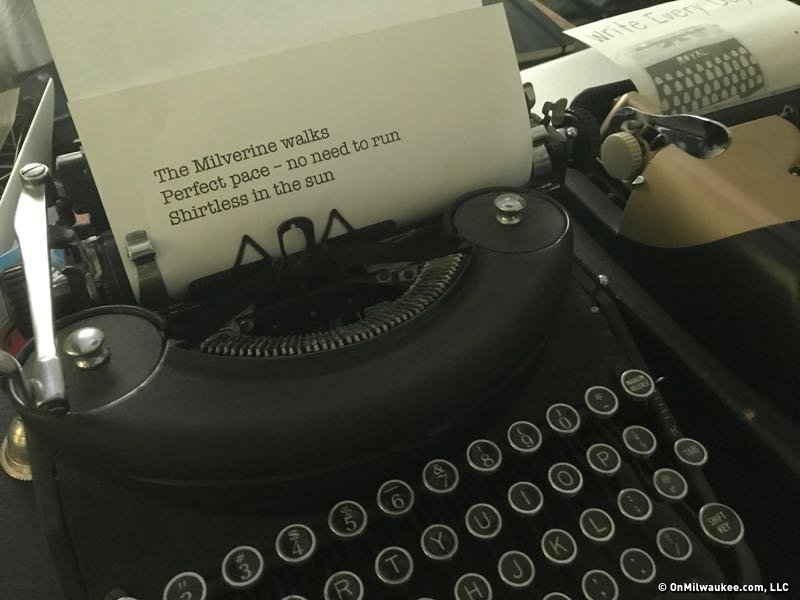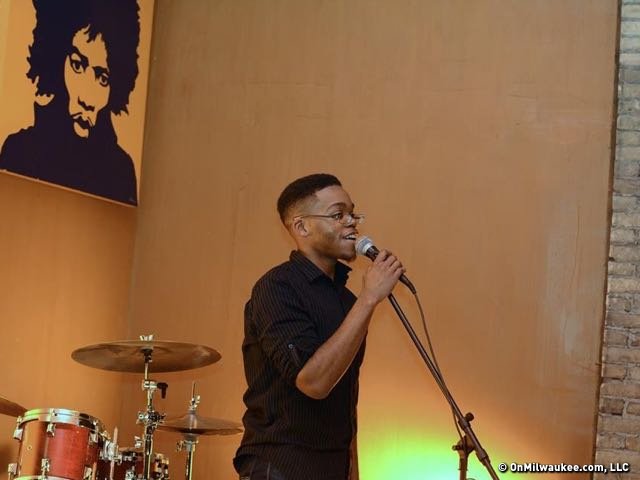People who dwell on the spectrum of poetry appreciation, from casual reading to life-long commitment, often encounter those who say they don't read poetry, don't "get" poetry or, in extreme cases, strongly dislike – maybe even hate – poetry.
But why?
"Because it's hard to read," says Jennifer L. Knox, poet and educator who lived in Milwaukee from 1993 to '98.
Readers sometimes feel separated from the poet, even though the intention of good poetry lies in the connection it makes with the human experience. Arrogance from poets will immediately turn off the audience, no matter how clever or decorative the language.
"People also hate it because poncy poets want to make people think that they—by virtue of the fact that they're poets – have special insight into feelings, like they're feeling superheros. People hate that 'I'm more sensitive than you' voice that inspires so many bad poems," says Knox, who received an MFA from New York University and taught poetry writing at Hunter College and New York University.
Over exposure to "bad" poetry is another reason people dislike the genre.
"There's a lot of bad poetry. Much of it sounds like written down babble from a support group that somebody got on stage to talk at people. 'I've got my five minutes here on this open mic and I want to make sure I confess every failed relationship or each time I was disappointed in my life, thanks for sitting there and taking it,'" says Ed Makowski, the author of numerous books of poetry and a former Pfister Narrator.
Writing poetry for an audience is not the same as writing poetry for oneself. Certainly there's value in writing poems or journaling to process feelings or just for enjoyment, but whether to move forward with sharing work with others is a decision that requires reflection.
"Writing is like cooking. You can cook anything you want – make it totally crazy – but who's gonna eat it? I want to make poems that people will eat, and marvel at," says Knox.
Jennifer Benka, also a former Milwaukeean, is the executive director of the Academy of American Poets based in New York City. She is the former managing director of Poets & Writers magazine. Poetry, she believes, is sometimes misunderstood because readers want to consume writing that's quick to comprehend and literal.
"It’s helpful to think about a poem as more like a painting. It is an art object that requires reflection, which requires a willingness to investigate and empathize and time," says Benka.
Some believe video games and "junk food" novels have made people even less interested in reading poetry. It could, however, be argued that poetry has a significant place in the fast-paced world because often a poem is short, yet packed with message. It seems poetry is ideal for modern attention-deficit society, and yet, it's not particularly popular.
If poetry wasn't taught in an appealing way and students were never turned on to the genre, then it's most likely not going to resonate with them later in life. Many people were forced to memorize poems in school and recite them in class, and might have bad memories of the experience, even if they still remember lines or entire poems many years later.
Paul Scot August says he is "deeply and completely in a committed long-term relationship with poetry." August has a graduate degree in creative writing, has attended multiple summer poetry workshops and has published work in The Los Angeles Review, Passages North and more.
He also believes poetry – including what was once labeled "academic poetry" – has become more accessible.
"It’s funny, people I meet – non-writers – for the most part say they like poetry, but don’t seem to actually read much of it," says August. "But so much poetry being written today is accessible and easier to relate to than maybe 'The Wasteland' or Pound’s 'Cantos.' And it is so good."
Finding it, however, can be a challenge.
"You won’t find it on the shelves in Barnes & Noble, squeezed in and around Maya Angelou, Billy Collins and Mary Oliver," says August. "Some indie bookstores like Boswell Books on Downer, have a very nice poetry section. Woodland Pattern has an enormous poetry section. You can spend hours there and find something for everyone."
Makowski says non-poetry readers often express surprise over the fact they can understand his work – and that they found it funny.
"That doesn't say anything about my writing, rather, it's an observation of the writing that has been previously placed in front of them," says Makowski. "My first goal is to communicate, and if I realize I'm not communicating anything worthwhile, I either conclude it's junk or it's been a useful way to expunge emotion that no one else needs to be made aware of."
The amount of education, according to Makowski, does not separate the "real" poets from the poseurs. Nor does it affect what the casual poetry reader wants to read.
"There are many more smarter, better read, highly educated poets out there than myself. But all that has very little to do with making a connection with a person holding a book under a desk lamp seated at their kitchen table as a car alarm honks half a block away," he says.
Susan Firer, a poetry professor at UWM, says people who say they don't like poetry should keep reading.
"There are many poetries. When someone tells me they don't like or 'get' poetry, I just assure them they haven't found their poetry yet," she says.
Molly Snyder started writing and publishing her work at the age 10, when her community newspaper printed her poem, "The Unicorn.” Since then, she's expanded beyond the subject of mythical creatures and written in many different mediums but, nearest and dearest to her heart, thousands of articles for OnMilwaukee.
Molly is a regular contributor to FOX6 News and numerous radio stations as well as the co-host of "Dandelions: A Podcast For Women.” She's received five Milwaukee Press Club Awards, served as the Pfister Narrator and is the Wisconsin State Fair’s Celebrity Cream Puff Eating Champion of 2019.







